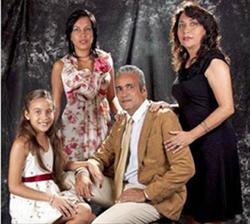
jailed by the regime of Fidel Castro, arrived in the United States from
Cuba yesterday with his family under a special resettlement program for
political refugees.
The Rev. Carlos Lamelas, 50, his wife, Uramis, and two daughters, Estephanie, 18, and Daniela, 10, landed at
Miami International Airport on Thursday on a direct flight
from Havana.
Lamelas, who once served as national
president of his denomination in Cuba, was granted asylum in the United
States due to persecution he has endured for more than five years at the
hands of Cuban authorities. On Feb. 20, 2006, security officials
conducted an early morning raid of his home and arrested Lamelas.
They
accused the successful evangelist and church planter of “human
trafficking,” a charge related to aiding Cubans who wish to escape Cuba
without government permission. Those close to Lamelas, however, said
police targeted him because he had challenged the Castro regime on
religious liberty issues.
During his imprisonment, hundreds
of letters poured in from fellow Christians around the world,
confirming their prayers for him and offering encouragement. Jailers
admitted to Uramis Lamelas that the correspondence created difficulties
for them, and that they “had decided on a change in procedure.”
Four
months after his arrest, Lamelas was unexpectedly released. Authorities
tried him in court in December 2006. The state prosecuting attorney
recommended acquittal on the human trafficking charge, which carries a
sentence of up to nine years in prison.
Later that month,
however, the court convicted Lamelas on a previously unannounced charge
of “falsifying documents” and fined him 1,000 Cuban pesos ($45). The
move was seen as an effort to save face and send Lamelas a message that
he was still under surveillance.
Denied means of employment
following his imprisonment (leaders of his denomination had earlier
expelled Lamelas from the church at the behest of government authorities), he supported his family as a freelance photographer.
Fearing
another unexpected arrest and possible long-term imprisonment, Lamelas
applied for political asylum in 2010 but was denied. He described the
ordeal to friends as “our spiritual waters of Mara. As when Moses was
leading the God’s people through the wilderness and, hungry and thirsty,
they found the bitter waters of Mara.”
A U.S. official in
Havana familiar with the Lamelas case encouraged him to reapply for
asylum. Following interviews with the family on March 22, the Department
of Internal Security determined they qualified as political refugees.
The
family will be resettled in Texas under the auspices of the Division of
Refugee Affairs of the U.S. Citizenship and Immigration Services.
Lamelas
admitted that the news that they had qualified as political refugees
came as a shock, albeit a welcome one. Tense months of waiting and
uncertainty had aggravated nagging health problems; he has suffered
from chronic stomach ailments since his imprisonment. But once he
learned of the asylum decision, he began to recover.
“For
our part, we have been open to the will of God, and we know He will take
us where we can best serve Him,” he wrote. “Our moral commitment with
the Lord’s work is permanent and without borders … We know that many
brothers and sisters have collaborated for our benefit, [and] we’re sorry
not to know specifically who they are. Nevertheless, we want them to
know that our love and gratitude is sealed in our hearts for the rest of
our lives.”











































